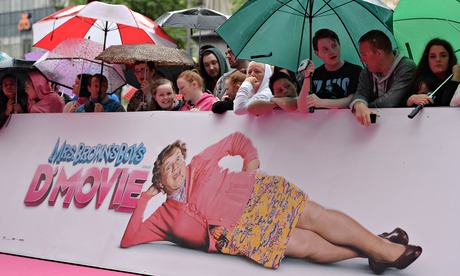
There are unlikely saviours and there are unlikely saviours. And then there is a 58-year-old man in bad drag clutching a pair of melons to his chest.
As anyone who has been past a billboard or seen a bus over the past month will know, the poster for Mrs Brown's Boys D'Movie is unavoidable. Everywhere you turn, there it is, goggling back at you. Some have smiled; some have gawped; others have racked their brains trying to remember if there was a sell-by date on jokes involving cross-dressing and cantaloupes. And a small number of people have dropped to their knees in gratitude. These are the ones who work in the film industry.
For it is Agnes Brown, the foul-mouthed creation of the Irish comedian Brendan O'Carroll, who has almost single-handedly saved the nation's cinemas during one of the worst droughts in recent memory. In part this fallow period is the fault of Roy Hodgson and his squad: England exited the World Cup earlier than anticipated, but too late for distributors to rejig their schedules.
It's also the legacy of the Olympics, two years ago. London 2012 proved so catastrophic for cinemas that many ended up simply throwing in the towel. They cancelled regular showings and instead opened their doors for free, hoping to attract crowds with big-screen Olympics coverage and flog enough at the concession stalls to offset some of their losses. Panicked distributors tried to insulate the hit by releasing films the moment it was all over (Brave and The Bourne Legacy actually opened on the Monday after the closing ceremony).
The ordeal heightened nerves. And so such counter-programming as was mustered up this time round was too timid to really compete with the footie – a couple of jukebox musicals (Jersey Boys, Walking on Sunshine) and an iffy teen weepie (The Fault in Our Stars).
This left the way open for the much more robust Mrs Brown and her boys to storm the multiplexes and make a killing. Last weekend the film opened at number one at the UK box office with £4.3m – more than the rest of the top five combined. Box office takings are still 51% down from the same weekend in 2013, but just imagine how bleak the landscape would be without her.
That Mrs Brown pulled off such a feat while attracting universally appalling reviews compounds the achievement. This may be populist auteurism, but it is auteurism nonetheless: a triumph of one man's vision over a chorus of disapproval – and, at a time when arts funding is being slashed, a shining example of non-subsidised success.
Analysts this week were struggling to account for just how O'Carroll had managed to lure quite so many fans off their sofas and into the cinema, especially given the advanced age of many. The answer lies in the show itself, which offers an innately theatrical experience; breaking the fourth wall, exposing gaffes, embracing amateurism. It may be dated; it may be shameless; but it is a quasi-live experience.
And is it these that are also throwing a lifeline to cinemas today. Just as readers hanker after a physical product as a break from their laptops, so too the multiplex is witnessing a backlash against screen saturation. Cinema-going in the UK is unaffected by new distribution platforms because it is an event experience, not merely a content channel. Its competitors are not Netflix and YouTube but restaurants, sporting events and concerts.
This is why big-screen streams of National Theatre and Met Opera productions sell out at sky-high prices; it is why the immersive experience offered by Secret Cinema, which allows audiences not just to watch movies but to live within them, can charge £60 a ticket. The future of cinema lies in offering a bricks-and-mortar venue in which to host an interactive experience.
Mrs Brown is not quite participatory, but it offers a form of cinema that invites boisterous audience engagement, and a glimpse of a future in which all film-makers will need to consider the crowd. In an ailing industry, here is a business model that delivers: last week, the news came through that D'Movie will be the first in a trilogy, with more from Mrs Brown due just in time for the Rio Olympics in 2016. So the next time you pass O'Carroll and his melons, don't roll your eyes – doff your cap. After all, who else would manage to get so much fruit advertised on the side of a bus?

